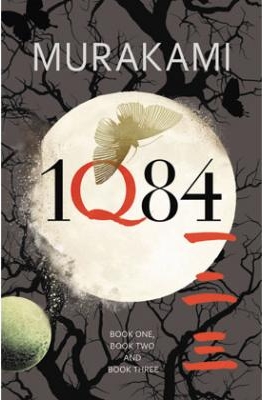I have been a fan of Haruki Murakami ever since I read Kafka on the Shore around three years ago. I’ve also read two other books of his, The Wind-Up Bird Chronicle and Norwegian Wood, which I found to be less entertaining or interesting than Kafka on the Shore. But I feel like those books delivered more than 1Q84.

Title: IQ84, いちきゅうはちよん [Ichi-Kyū-Hachi-Yon]
Author: Haruki Murakami translated by Jay Rubin and Philip Gabriel
Published: August 28, 2009
Genre: Contemporary, Fantasy, Japan, Japanese Literature, Magical Realism, Science Fiction, Translated Works
Rating: 🌟🌟🌟
Trigger Warnings: Animal Death, Blood, Child Abuse, Contemporary, Death of a Parent, Domestic violence, Fiction, Gore Depiction, Hospital, Needles, Syringes
Summary
Review
I can’t deny that 1Q84 is an ambitious book. All the elements Murakami has used in his other books are present, but here, the sequence and plot have a lot more to offer in terms of magical realism, time warps, and other-worldly events. These worlds tie together in intriguing ways.
The characters are distinct for me, which is ironic because the way they converse often very similar. Due to the length of this book, Murakami had a lot of space to flesh out each character, allowing me to identify each character by their manner of speaking alone.
There are also parts in the book that deal with the male gaze on women, especially the references to breasts. I don’t easily get offended, and when I read these sections, it feels like a look into how a man’s brain might work when seeing women. As a woman myself, it’s creepy but also interesting to see these thoughts included without much sensitivity to the readers.
Aomame’s criticism of women was a nice touch, highlighting women’s expectations and showing Aomame as a pilgrim of these expectations. This is something I don’t often see in other books, where we see more explicit conversations of the characters’ stances on gender discussions. Also, the mentions of bald men in this book are so humorous—what’s up with Murakami and bald men, honestly?
Many people, myself included, find Murakami’s books to contain a lot of sexual scenes, which can be a bit of a red flag. However, because his worlds don’t really function within the bounds of our reality, he seems to get away with it in his storytelling. For me, events that would typically raise moral concerns in our world don’t necessarily carry the same weight in his fictional universe. I acknowledge that this is his creative choice, though I don’t endorse it and believe it should stay confined within the book.
We can see Murakami’s style of writing in this book, perhaps on a larger scale given its length, and it seems the publisher gave him leeway to write whatever he wanted. Still, I feel like this could really be shorter, as its length ruined the experience for me. Maybe the numerous descriptions of women’s bodies could have been cut down, as these must have taken up many pages. Plus, the scenes about women exploring each other’s bodies, in my humble opinion, don’t add anything to the plot.
I find Murakami’s books bewildering and confusing but in a fun way. However, with this one, it just feels like torture. At the end, I had so many questions and loose ends. Plus, the drag of reading such a lengthy book—after finishing Book One, I felt like I continued reading (or listening, as I had the audiobook as well) just for the sake of finishing it.
Final Thoughts
IQ84 could honestly be shorter. It is ambitious in what it’s trying to achieve, but I think plenty of parts could be cut down to spare readers from reading repetitive descriptions. As you’d expect from Murakami’s work, it has his usual themes: bizarre dreams, sex, jazz, unreality, worlds that don’t make sense, and characters that are weird and peculiar in their own ways. They’re enjoyable in their own right, but the length kind of killed the fun for me.
For Murakami readers, do I need to say more? Please read this so we can discuss it in the comments. Despite its length, I would still recommend it for the familiar themes Murakami fans love. However, if you’re new to his work, maybe start with Norwegian Wood because it’s shorter and a bit more straightforward. Or try Kafka on the Shore, my favorite, where I felt more connected to the protagonist.
Have you read any Murakami books? Feel free to share your thoughts in the comments!
Leave a Reply